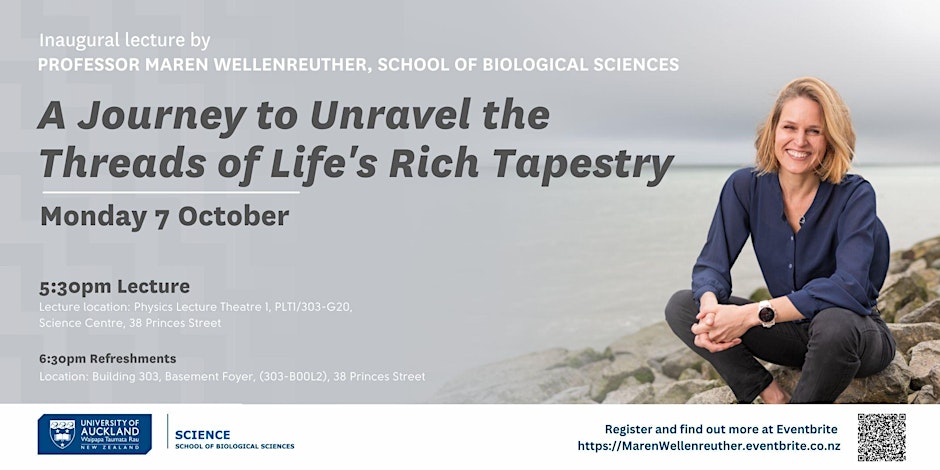| 2022 |
Radio Interview at RNZ - Land based salmon farm - the way of the future?  (link) (link)
|
| 2022 |
British Ecological Society Journals - Blog Associate Editor, Julie Koch Sheard, sits down with the Guest Editors of Journal of Animal Ecology's Special Feature, Understanding climate change response in the age of genomics.
As global temperatures continue to rise, there is a major threat to species and ecosystems worldwide. In order to develop conservation and mitigation strategies, and understanding of how animal populations respond to changing environments is crucial.
Recent genomics-based studies have begun to shed light on the mechanisms by which animal populations respond to climate change and offer methods to predict how they will respond in the future. This Special Feature highlights emerging genomics approaches and their applications across a diverse range of animal species; exploring range shifts, phenotypic plasticity and local adaptation of animal populations. By connecting these topics and their ecological implications, this feature aids researchers in using genomics to understanding climate change response.  (link)(blog post) (link)(blog post) |
| 2021 |
Plant & Food Research podcasts 'Fishing For the Answers: applying DNA sequencing to study the species in our oceans': Hoki is one of the most important fish species for the NZ seafood industry. Understanding more about the populations of hoki around NZ is vitally important for the future management and conservation of the species. Andrew Dare speaks with scientists Maren Wellenreuther and David Chagné about the assembly of the hoki genome and how genomic tools were used to get insights into the population structure of this species. This new knowledge can be used to inform management of hoki stocks in New Zealand and showcases the power of genomic approaches in getting insights into the biology of hard to study aquatic species. (link) |
| 2020 |
Scigest - Plant & Food Research podcasts 'Breed like fish': Seafood breeding and plant breeding have a lot in common. Dr Maren Wellenreuther is harnessing plant breeding knowledge to increase the growth rate and tolerance of trevally and snapper while maintaining the health and genetic diversity of the species in an accelerated breeding programme.  (link) (link) |
| 2018 |
Radio New Zealand 'Our Changing World' with Allison Ballance: Snapper may be next farmed fish  (link) (link) |
| 2024 |
Seafood NZ December 2024  |
| 2024 |
Government Funding For Developing Fish Products In The Lab  (link) (link) |
| 2022 |
Snapper ready to go semi-commercial - August 2022 Newsletter - Marine Farming Association  |
| 2022 |
Do I make myself clear? Media training for scientists  |
| 2022 |
Salmon farmers seek cooler waters as climate changes  (link) (link) |
| 2021 |
Virtual signing between Bay of Plenty iwi and NZ science-technologists towards world-class marine development  (link) (link) |
| 2021 |
New insights to breed native fish  (link) (link) |
| 2021 |
Women in STEM: 'Stories from innovative New Zealand women of all ages and backgrounds who work with science, technology, engineering, maths and mātauranga Māori: Dr Maren Wellenreuther' by Curious Minds, He Hihiri i te Mahara  (link) (link) |
| 2021 |
Expert opinion on the Fishing 2040 report: 'The Future Of Commercial Fisheries' by the Science Media Centre  (link) (link) |
| 2020 |
Interviewed by Erik Stokstad for an article in the magazine Science: New genetic tools will deliver improved farmed fish, oysters, and shrimp. Here’s what to expect.  (link) (link) |
| 2020 |
Hamilton award interview write up by the Royal Society of New Zealand  (link) (link) |
| 2020 |
Plant & Food Research joins forces with Māori groups  (link) (link) |
| 2019 |
Hendrix Genetics and Plant & Food Research sign an agreement to develop underwater vision technology for measuring aquaculture broodstock  (link) (link) |
| 2018 |
Interviewed by Charlotte Schubert for an article in the magazine Science: Do I make myself clear? Media training for scientists.  (link) (link) |
| 2017 |
The quest for sustainable seafood – An international research consortium calls for fisheries and aquaculture management to tap into the power of genomics  (link) (link) |
| 2017 |
Nelson Mail Article: Researcher probes deep secrets to boost fish stocks  (link) (link) |
| 2017 |
Aquaculture Magazine October 2017: Fishing industry urged to hook into genomic tools  (link) (link) |
| 2017 |
Seafood NZ June 2017  (link) (link) |
| 2016 |
Seafood NZ February 2016  (link) (link) |
| 2013 |
Sydsvenskan article about insect monitoring   (link) (link) |
| 2012 |
Article written by the Lund Postdoc Society about my colour polymorphism research |
| 2004 |
Newspaper article in the Spiegel  (link) (link) |
 (link)
(link) (link)(blog post)
(link)(blog post)  (link)
(link)  (link)
(link) 

